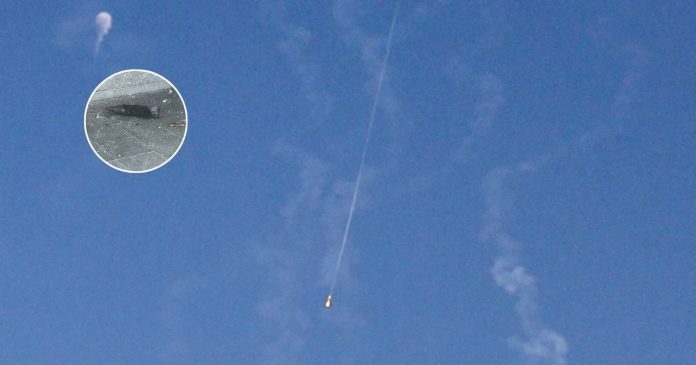In a dangerous turn in the ongoing conflict between Israel and Iran, Iran has reportedly used a cluster bomb during its June 19 missile attack on Israel. The Israeli military confirmed that one of the missiles launched carried a cluster bomb warhead, sparking global concern over the use of such weapons. The attack caused damage in the central Israeli town of Azor, though there were no casualties reported at the time.
What is a Cluster Bomb?
A cluster bomb is a special kind of weapon that does not explode all at once. Instead, it opens in the sky and drops many smaller bombs, called submunitions, over a large area. These smaller bombs are meant to explode when they hit the ground, but many times they do not explode right away. This makes them very risky because they can injure or kill civilians later.
In this recent attack, the Israeli Defence Forces (IDF) said that the warhead exploded around 7 kilometres above ground and scattered about 20 submunitions across an 8-kilometre radius. That’s a very wide area, especially dangerous if it includes civilian homes, schools, or crowded places.
Animation Video of how cluster bomb works:
Why Are Cluster Bombs So Controversial?
The biggest worry with cluster bombs is their indiscriminate nature. These bombs do not target only military sites. Instead, they spread over a wide area, and many don’t explode immediately. They remain on the ground and can explode later when touched—often by civilians, including children.
According to arms expert Daryl Kimball, cluster bombs are “egregious weapons” because they leave dangerous unexploded bombs behind. Their use in civilian areas can lead to tragedies long after a war is over.
What Damage Did the Iran Missile Cause?
Reports say that one of the submunitions hit a house in Azor, causing damage to property. Thankfully, there were no reports of injuries or deaths. After the incident, the Israeli Home Front Command issued a warning, advising people not to touch any suspicious objects on the ground and to call emergency services immediately.
How Are Cluster Bombs Different from Regular Missiles?
A normal missile explodes in one powerful blast. But a cluster bomb spreads destruction over a large area using many smaller bombs. Each submunition might not be very powerful on its own, but together they can cause big damage. And because they cover a wider area, they’re harder to control and more dangerous in cities and villages.
A senior Israeli military official explained that while each submunition is small, together they pose a serious threat, especially in crowded areas.
Are Cluster Bombs Banned Worldwide?
Yes, mostly. In 2008, many countries signed the Convention on Cluster Munitions, agreeing to ban the use, making, and transfer of these weapons. So far, 111 countries have joined this treaty. But some powerful countries—including Iran, Israel, the United States, and Russia—have not signed it.
That’s why cluster bombs are still being used in conflicts like Ukraine and now between Iran and Israel.
What Happens Now?
This latest development adds a dangerous element to an already tense situation. Experts are warning about the risks to civilians, especially children who might come across unexploded bombs. Governments and defence agencies are once again under pressure to follow international treaties and avoid weapons that put innocent lives at risk.
The world will now watch closely to see how Israel responds and whether international pressure will increase on countries still using cluster bombs in modern warfare.
Iran’s reported use of a cluster bomb in its missile attack on Israel has raised serious concerns worldwide. These weapons are banned by over 100 countries due to the long-term danger they pose to civilians. With global tensions rising, this incident is a reminder of how war affects ordinary people the most—and why certain weapons must be kept out of use.
Also Read: Power Failure Behind Ahmedabad Air India Crash? What Investigators Have Found So Far
FAQs
What is a cluster bomb?
A cluster bomb is a weapon that drops many smaller bombs over a large area, causing widespread damage and leaving dangerous unexploded bombs behind.
Did Iran use a cluster bomb against Israel?
Yes, according to Israel’s military, one of Iran’s missiles on June 19 had a cluster bomb warhead.
Are cluster bombs banned?
Yes, by over 100 countries. But Iran, Israel, the US, and Russia have not signed the global treaty banning them.
What damage was caused in the June 19 attack?
A house in Azor, central Israel, was damaged. No casualties were reported.
Why are cluster bombs considered dangerous?
Because they often leave unexploded small bombs behind, which can hurt or kill civilians even long after the conflict ends.





